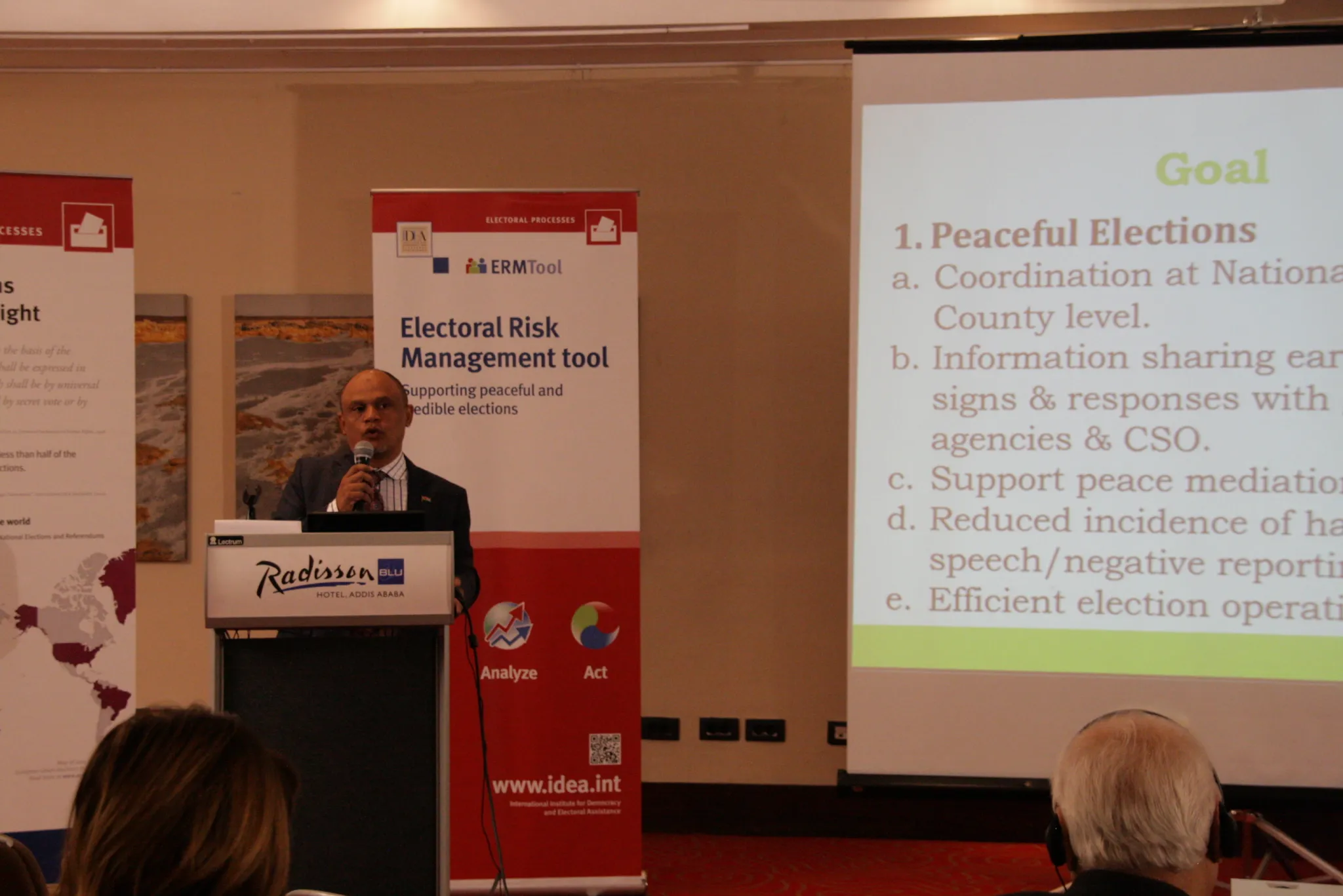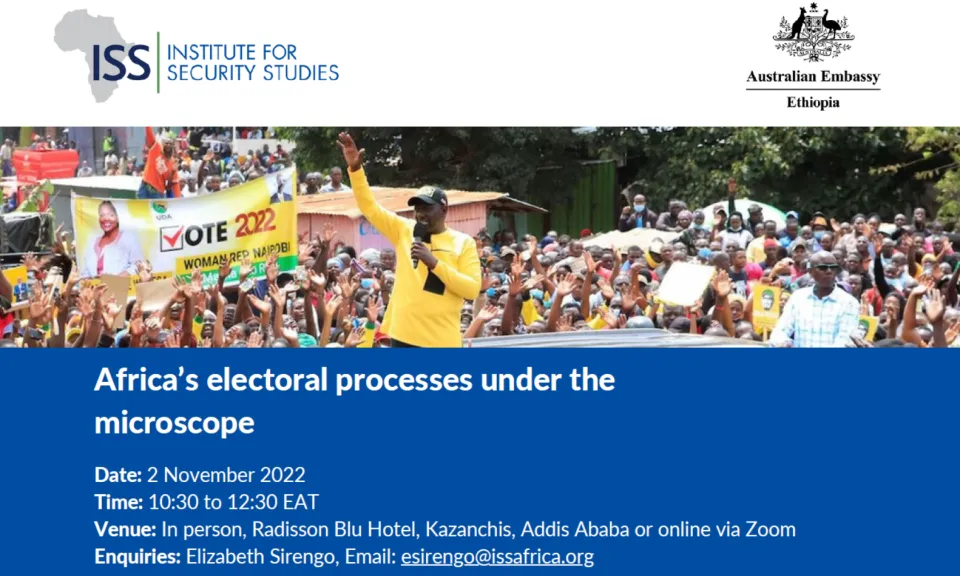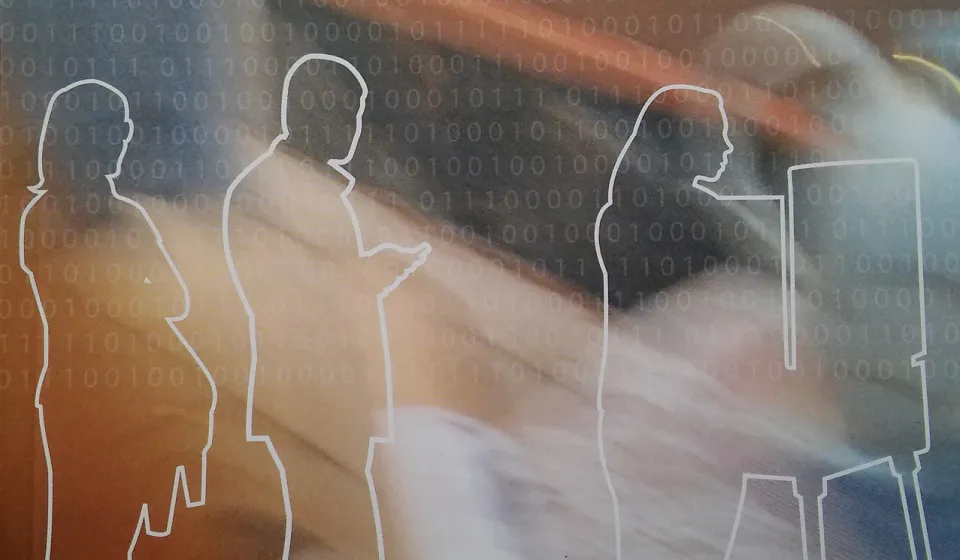Electoral Risk Management (ERM) Conference 2015

The conference facilitated the exchange of the best electoral risk management practices and popularize the concept as a new standard for conducting democratic elections was well achieved.
Discussions among 80 participants included theoretical and practical aspects of risk management in elections.
View the 27 presentations (PDFs) shared that acknowledge challenges and good practices in the identification, analysis and prevention and mitigation of electoral risks.
A G E N D A
Day 1: Tuesday, 1 December 2015
09:00 – 09:45 WELCOMING REMARKS
- Adebayo Olukoshi, Director Africa Programme, International IDEA
- Olabisi Dare, Acting Head of Division for Humanitarian Affairs, Department of Political Affairs, The African Union Commission
- Keboitse Machangana, Director of Global Programmes, International IDEA
09:45 – 10:15 KEYNOTE
Dr. S. Y. Quraishi, Member of International IDEA Board of Advisors and former Chair of Election Commission of India (Powerpoint-1)
PLENARY SESSION 1: Electoral risk management
Chair: Adebayo Olukoshi, Director, Africa Programme, International IDEA
- Electoral risk management as a new standard in organizing elections, Sead Alihodzic, Senior Programme Officer, International IDEA (Powerpoint-2)
- Promoting and supporting electoral risk management in Africa - the AU and IDEA project, Idrissa Kamara, Programme Officer, AU Democracy and Electoral Assistance Unit (DEAU)
Discussion
14:00 – 15:30 BREAKAWAY SESSIONS
Group 1: Technical and operational risks
Chair: Chair: Marie-Laurence Jocelyn Lassegue, Programme Manager, International IDEA, Haiti
- Electoral Risks: An Australian Perspective, Kevin Kitson, Deputy Election Commissioner, Australia (Powerpoint-3)
- Risk management for greater accountability and transparency (ERMTool user); Myanmar 2015, Gregory Kehailia, Senior Programme manager, International IDEA Office in Myanmar (Powerpoint-4)
Group 2: Political and legal risks
Chair: Erik Asplund, Programme Officer, International IDEA
- Political and legal risks – Mexican experiences; Alejandro Scherman Leaño, Chief Chihuahua State, INE Mexico (Powerpoint-5)
- Electoral Risk Management in Bosnia and Herzegovina (ERMTool user), Irena Hadziabdic, Member of Central Election Commission of Bosnia and Herzegovina (Powerpoint-6)
Group 3: Security risks
Nadia Haddad, Assistant Programme Officer, International IDEA
- Security Situation in Libya from an Electoral Perspective 2015 (ERMTool user), Faraj Mohamed Zaid, Head of Operation, High National Elections Commission of Libya (Powerpoint-7)
- Security risks in the Electoral Process: Experience and challenges in Madagascar, Philibert Hervé Andriamanantsoa, Commissioner, CENI Madagascar (Powerpoint-8)
15:45 – 17:00 PLENARY SESSION 2: Group feedback and discussion
Chair, Mette Bakken, Programme Officer, International IDEA
Day 2: Wednesday, 2 December 2015
09:00 – 10:00 PLENARY SESSION 3: Assessment and analysis of electoral risks
Chair: Gregory Kehailia, Senior Programme manager, International IDEA Office in Myanmar
- Systems and practices for data collection, Granville Abrahams, Senior Manager Electoral Matters, Electoral Commission of South Africa (Powerpoint-9)
- Engendering Elections Data, Gabrielle Bardall, University of Montreal, Elections Expert (Powerpoint-10)
Discussion
10:00–11:30 BREAKAWAY SESSIONS
Group 1: Assessment, analysis and monitoring of electoral integrity
Chair: Abdurashid Solijonov, Programme Officer, International IDEA
- Observing (and assessing) the good election: new approaches to electoral obligations and integrity from the Carter Center, Connie Moon Sehat, Associate Director, Democracy Program, The Carter Center (Powerpoint-11)
- Collecting and analyzing election risk data in high risk environments: lessons from Burundi 2010-2015, Gabrielle Bardall, University of Montreal, Elections Expert (Powerpoint-12)
Group 2: Electoral risk data collection and analysis
Chair: Sead Alihodzic, Senior Programme Officer, International IDEA
- Electoral Risk Data Collection and Analysis: Opportunities and Challenges: The Kenyan Experience (ERMTool user), Dr. Catherine Kamindo, Manager, independent Electoral and Boundaries Commission of Kenya (Powerpoint-13)
- Collection and analysis of electoral risk data in Kyrgyzstan (ERMTool user), Elnura Omurkulova-Ozierska, Research Officer, National Institute for Strategic Studies, Kyrgyzstan (Powerpoint-14)
11:45 – 13:00 PLENARY SESSION 4: Group feedback and discussion
Chair, Idrissa Kamara, Programme Officer, AU DEAU
14:00–15:00 PLENARY SESSION 5: Prevention and mitigation
Chair: Annette Fath-Lihic, Senior Programme Manager, International IDEA
- Prevention and mitigation or electoral risks - A three layered approach, Nicholas Matatu, Programme Officer, International IDEA (Powerpoint-15)
- Improved management of Electoral Risk for Peace - Ghana Experience, Ahmadu Sulley, Commissioner, Electoral Commission of Ghana (Powerpoint-16)
Discussion
15:00–16:15 BREAKAWAY SESSIONS
Group 1: Improved electoral management and justice
Chair: Peter Wolf, Technical Manager, International IDEA
- Effective Legal Frameworks for Electoral Justice, Frank McLoughlin, Programme Officer, International IDEA (Powerpoint-17)
- Improved electoral management and justice: Mexican experiences,
- Justice Gabriela Villafuerte Coello, Justice at Electoral Tribunal, Mexico
Group 2: Improved electoral security
Chair: Seema Shah, Programme Officer, International IDEA
- Management of security risks to Indian elections, Shri Sudeep Jain, Director General, Election Commission of India (Powerpoint-18)
- Management of security risks to the 2015 General elections in Nigeria (ERMTool user), Agoha Ifeanyi, Head International Liaison & Outreach, The Independent National Electoral Commission (INEC), Nigeria (Powerpoint-19)
Group 3: Improved infrastructure for peace
Chair, Erik Asplund, Programme Officer, International IDEA
- Preventing Election Violence: Towards Evidence-based Practice, Jonas Claes, Senior Programme Officer, United States Institute of Peace (USIP) (Powerpoint-20)
- Joint Election Operation Centre Nepal: ERMTool experiences, Diwas Pant, ERM Team, International IDEA Nepal (Powerpoint-21)
16:30 – 17:30 PLENARY SESSION 6: Group feedback and discussion
Chair: Sead Alihodzic, Senior Programme Officer, International IDEA
Day 3: Thursday, 3 December 2015
09:00 – 10:00 PLENARY SESSION 7 : Risk management as a new standard in organizing elections
Chair: Dr. Annette Fath-Lihic, Senior Programme Manager, International IDEA
- International IDEA’s Electoral Risk Management Tool (ERMTool), Sead Alihodzic, Senior Programme Officer, International IDEA (Powerpoint-22)
- Institutionalization of the ERMTool in Nepal, Ayodhi Prasad Yadav, Chief Election Commissioner, Election Commission of Nepal (Powerpoint-23)
- Institutionalization of the ERMTool in Kenya, Mohamed Alawi Hussun, Commissioner, Independent Electoral and Boundaries Commission of Kenya (Powerpoint-24)
Discussion
10:00 –11:00 BREAKAWAY SESSIONS
Group 1: Building knowledge resources and peer network
Chair: Frank McLoughlin, International IDEA
Group 2: Advancing the ERMTool
Chair: Peter Wolf, International IDEA
- Utilization of Information Technology for Electoral Management (ERMTool user), Choloraj Phewban, Inspector General, Office of The Election Commission of Thailand (Powerpoint-25)
- An Introduction to ELMO: Data collection for Election observation and beyond, Daniel Bruce, Program Associate, The Carter Center (Powerpoint-26)
11:00 –11:15 PLENARY SESSION 8: Group feedback and a way-forward discussion
Chair: Sead Alihodzic, Senior Programme Officer, International IDEA
12:00–12:30 PLENARY SESSION 9: Closing remarks
- Dr. Khabele Matlosa, Director Political Affairs, The African Union Commission
- Matshidiso Kgothatso Semela-Serote, Senior Programme Officer, Africa Programme, International IDEA



